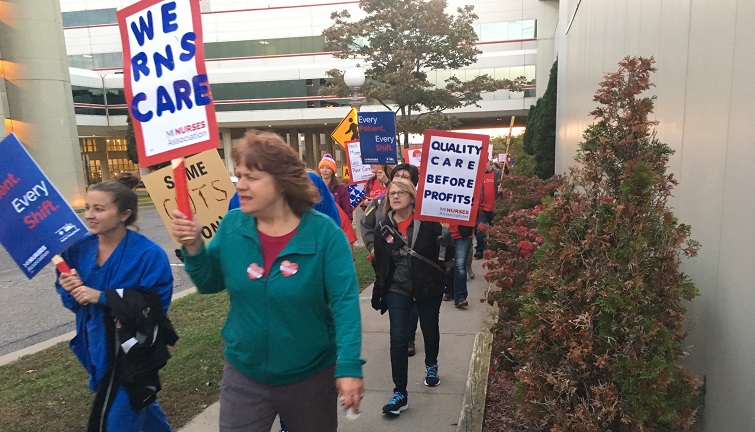Nurses show support for Safe Patient Care Act in Lansing 8 weeks after strike

LANSING — The Michigan House Health Policy Committee heard testimony from registered nurses and the public concerning the Safe Patient Care Act on Wednesday.
According to a press release from the Michigan Nurses Association, more than 70 registered nurses from around the state attended the hearing, including several from Marquette. The Marquette nurses went on strike for two days in October over unsafe staffing levels at UPHS — Marquette that led to patient safety issues.
“Registered nurses appreciate this opportunity to raise awareness about this legislation, which is needed to make sure that hospitals create conditions in which nurses can keep our patients safe from harm and provide the best care possible,” said John Armelagos, RN and president of the Michigan Nurses Association in the statement. “The Safe Patient Care Act has broad support from legislators from both sides of the aisle. This hearing represents a sea change in terms of more legislators recognizing this as an urgent, nonpartisan public safety issue. Michigan nurses applaud Chairman Vaupel for bringing the Safe Patient Care Act up in committee and we look forward to continuing to work with all legislators to move this forward.”
The Safe Patient Care Act is made up of three bills that aim to increase the safety of patients in Michigan’s hospitals and maintain a strong nursing workforce:
- HB 4629 establishes safe limits on the number of hospital patients a nurse can be assigned. There is currently no law, which too often results in nurses being stretched too thin to provide safe care.
- HB 4630 limits the number of hours a nurse can be ordered to work to 12 consecutive hours, with exceptions for special circumstances. Currently, there is no law regarding hours, so nurses too frequently are forced to work 16 or 18 hours at a time.
- HB 4631 adds transparency to hospitals by requiring them to disclose their RN-to-patient ratios so consumers can make informed decisions.
The Safe Patient Care Act was introduced in previous session, but this time, the legislation is broken up into three parts and has more bipartisan support than ever. Fifty-one legislators have signed on to at least one of the bills in the package. State Rep. Ed McBroom and State Senator Tom Casperson showed their support for the legislation during the strike in October.
“As policymakers, we want to fix the problem of Michigan having no law that limits the number of patients that a nurse can be assigned at one time,” said Rep. Jon Hoadley (D-Kalamazoo), sponsor of HB 4629. “While many hospitals do fine with staffing, we know from listening to RNs around the state that there are too many times when nurses are stretched too thin and can’t keep their patients safe and well-cared for. It doesn’t make sense that we have laws that require day cares to have a certain number of caregivers per child but when it comes to sick or injured kids, we have no law to make sure their nurse doesn’t have an unsafe number of patients.”
Rep. Stephanie Chang (D-Detroit), sponsor of HB 4630, said she has heard too many horror stories about nurses being ordered to work 16 or 18 hours in a row, which is unsafe.
“While nurses are hard-working and dedicated professionals, it’s unreasonable to expect them to provide good care when they are exhausted or sleep deprived,” Chang said. “We have laws that limit working hours for truck drivers and airline pilots to keep the public safe, and we should have a law for nurses, too. There is wide, bipartisan support for this bill to protect registered nurses from being forced to work excessive overtime because it just makes sense.”
Rep. Aaron Miller (R-Sturgis) sponsored the bill to require hospitals to disclose their actual RN-to-patient ratios, which can vary widely from their plans. Miller said this Legislature has taken strong leadership when it comes to transparency, and he hopes it would stay true to that principle as it applies to the public’s concerns about health care.
“It’s wrong that consumers and employers don’t have access to basic information about hospital care, including how many patients a nurse has to take care of at one time,” Miller said. “Transparency in healthcare is essential so that people can make informed decisions about spending their hard-earned money, and it’s a principle that all legislators can get behind. Since the number of patients per nurse is a key indicator of good outcomes for hospital stays, it’s one of the factors that we all should have the right to know.”
The Safe Patient Care Act is also pending in the Senate. The three corresponding bills are as follows:
- SB 387 is identical to HB 4629, which discusses safe limits on patient assignments.
- SB 388 is identical to HB 4630, which covers limits on forced overtime for RNs.
- SB 389 is identical to HB 4631, which adds transparency on RN-to-patient ratios.
No vote on the Safe Patient Care Act has been scheduled yet.
